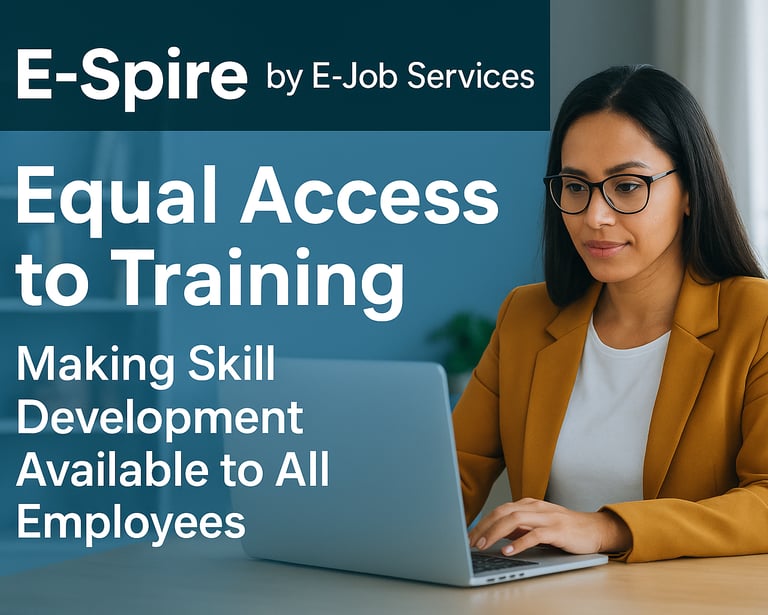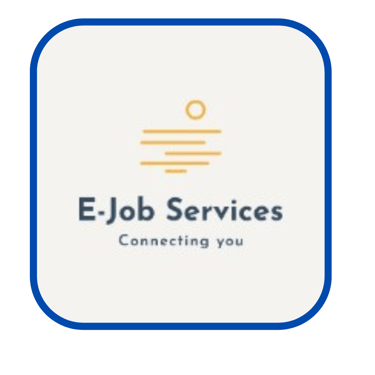Equal Access to Training: Making skill development available to all employees
Too often, lower-level employees are excluded from training opportunities. This article explores the impact of that exclusion, grounded in Caribbean/TT context, and outlines actionable strategies for ensuring equal access to skills development across all levels.
HR & ORGANIZATIONAL ISSUES
E-Spire (by E-Job Services)
10/6/20252 min read


In many organizations, training and development opportunities are clustered at higher levels, leaving lower-level employees sidelined. This inequity not only limits individual growth, it undermines organizational capacity and morale. Ensuring equal access to training is essential for a dynamic, inclusive workforce.
The Training Gap: Who Gets Left Behind?
Numerous studies show that lower-skilled or lower-status employees report far fewer employer-funded training opportunities than managerial or professional staff.
A Gallup survey found that 58% of employees seek learning and development opportunities beyond what their employer offers, suggesting internal offerings may not be meeting needs.
Meanwhile, many HR teams treat L&D as a cost rather than an investment. Over 50% of HR professionals report resistance to training budgets from leadership.
Globally, firms with strong training programs generate up to 218% higher per-employee income than those without such programs.
These patterns often affect frontline, clerical, production, or junior staff—those who arguably could benefit most from upskilling.
Why the Caribbean & Trinidad & Tobago Context Matters
In the Caribbean region, labour market inequities remain deeply entrenched. The Caribbean Development Bank highlights systemic disparities in access to opportunities, especially among women, youth, and marginalized groups.
In Trinidad & Tobago, firms often cite a skills shortage, particularly in the semi-skilled and technical workforce. Many job postings require prior training or certifications, which lower level employees seldom possess.
An official labour skills assessment in Trinidad & Tobago noted that in ICT and services subsectors, gaps exist between what current workers have and what future roles demand.
In effect, lower-level employees are caught in a cycle: no training → skills lag → fewer opportunities → stagnation.
The Costs of Exclusion
When a company limits training access:
Morale and engagement drop. Employees feel undervalued.
Turnover increases. Workers leave when they see no path ahead.
Internal talent pipelines shrink. Organizations must look externally for needed skills.
Inequality worsens. Those in lower tiers fall further behind, reinforcing class or income divides.
Strategies for Equitable Training Access
Conduct a skills audit across levels
Identify gaps in every tier and map training needs.Reserve slots for lower-level staff
For example, require that a healthy percentage (e.g. 40–50%) of training seats be allocated to non-supervisory roles.Offer flexible modalities
Use micro-learning, online modules, blended delivery, and after-hours options to accommodate shift workers or those with tight schedules.Provide time (paid) for training
If employees must use their own time, many lower-tier staff will opt out.Mentorship and peer learning
Pair junior employees with mentors. Encourage peer-led workshops and knowledge sharing.Transparent communications
Publish training calendars, eligibility criteria, and application processes to all staff.Monitor outcomes and feedback
Track participation by level, promotions, retention, and employee feedback. Adjust programs accordingly.Leadership buy-in
Leaders must view training as strategic, not optional. Champion inclusion from the top.
A Call to Action
Every employee, regardless of their job title, deserves the chance to grow, adapt, and contribute fully. Organizations that democratize access to training not only foster loyalty and engagement, they cultivate resilience and innovation.
Let’s commit to an inclusive culture where every role is supported in learning.
References
Gallup – Addressing the Barriers Blocking Employee Development
Edstellar – Corporate Training Statistics
Caribbean Development Bank – Labour Market Differentials in the Caribbean
Trinidad & Tobago Labour Skills Assessment (ICT Platforms & Services Sub-Sector)
Other studies on training, inequality, and workforce development in Caribbean region
